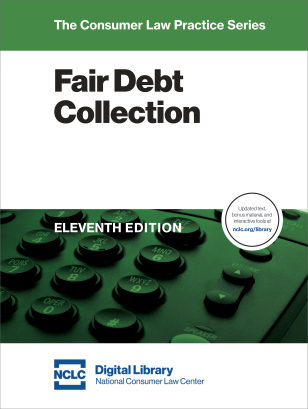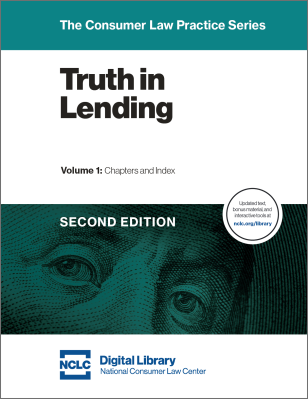A new CFPB advisory opinion, published at 87 Fed. Reg. 39733 (July 5, 2022), clarifies the limits on a debt collector’s ability to charge pay-to-pay or convenience fees under the Fair Debt Collection Practices Act (FDCPA). The advisory opinion also has important implications as to a wide array of other charges assessed by debt collectors.
This article examines the advisory opinion and details its implications for finding that other debt collector fees violate FDCPA § 1692f(1). The article considers a consumer’s Truth in Lending Act remedies when a creditor or debt collector assesses fees for automatic payments on a credit card obligation. The article also discusses when a debt collector, creditor, or merchant can be liable under a state UDAP statute for unfair or deceptive pay-to-pay practices.
The CFPB’s Advisory Opinion on Pay-to-Pay Fees
Pay-to-pay charges or convenience fees are added charges when a consumer makes certain types of payments by telephone or on a website. The new CFPB advisory opinion explains when a debt collector assessing these charges violates FDCPA § 1692f(1) (15 U.S.C. § 1692f(1)) that prohibits collecting “any amount (including any interest, fee, charge, or expense incidental to the principal obligation) unless such amount is expressly authorized by the agreement creating the debt or permitted by law.” The advisory opinion’s logic applies to other debt collector fees and charges.
The advisory opinion is effective July 5, 2022. FDCPA § 1692k(e) specifies that debt collectors have a defense of good faith conformity with a formal CFPB advisory opinion. See NCLC’s Fair Debt Collection § 12.4.1. The CFPB’s Regulation F, app. C lists FDCPA advisory opinions issued by the CFPB. This is the Bureau’s second FDCPA advisory opinion.
CFPB Clarifies Three Elements of a § 1692f(1) Violation
The CFPB advisory opinion clarifies three elements of a § 1692f(1) violation:
- Any Amount—FDCPA § 1692f(1) prohibits collection of “any amount” unless it is expressly “authorized by the agreement creating the debt” or “permitted by law.” The CFPB advisory opinion clarifies that, although the statutory provision explicitly mentions “interest, fee, charge, or expense incidental to the principal obligation,” this is prefaced by “including,” so that this list illustrates but does not limit coverage under § 1692f(1). The CFPB also interprets § 1692f(1) to apply to “any amount” even if that amount is not “incidental to the principal obligation.” The CFPB concluded that pay-to-pay fees are an "amount" under § 1692f(1). [The CFPB also concluded that pay-to-pay charges are “incidental to” the principal obligation because they are both related to and subordinate to the principal obligation (see CFPB advisory opinion note 19).]
- Authorized by the Agreement Creating the Debt—FDCPA § 1692f(1) prohibits the collection of pay-to-pay fees unless expressly “authorized by the agreement creating the debt.” The CFPB clarifies that this means that “the agreement creating the debt expressly permits the charge and some law does not prohibit it.” The CFPB rejects the argument that a separate agreement (other than the one creating the debt) is sufficient to satisfy § 1692f(1). Thus, even a separate contractual agreement between the consumer and debt collector authorizing the fee does not prevent violation of § 1692f(1) where such fee was not authorized by the agreement creating the debt. Moreover, for a fee to be authorized by the agreement creating the debt, the agreement’s authorization for that fee must be consistent with applicable law. FDCPA § 1692f(1) is violated where the credit agreement authorizes illegal charges.
- Permitted by Law—“Permitted by law” means “some law expressly permits the charge, even if the agreement creating the debt is silent.” It is not enough that applicable law fails to prohibit the charge—a charge is only “permitted” if the applicable law specifically allows for the charge. If the law silent on the legality of a particular fee that fee is not “permitted by law” under § 1692f(1).
In short, there is a § 1692f(1) violation if a debt collector seeks any amount unless such amount is authorized by the agreement creating the debt (which is a charge not prohibited by law) or applicable law affirmatively authorizes the charge. For a general discussion of § 1692f(1), see NCLC’s Fair Debt Collection § 8.3.
FDCPA § 1692f(1) Applies to a Variety of Debt Collectors
FDCPA § 1692f(1) violations are applicable to entities that qualify as debt collectors under FDCPA § 1692a(6), including:
- Third-party collection agencies—see NCLC’s Fair Debt Collection §§ 4.7.2, 4.7.3;
- Debt buyers whose principal purpose is debt collection—see NCLC’s Fair Debt Collection § 4.7.2.2;
- Mortgage servicers that acquire the account after default—see NCLC’s Fair Debt Collection § 4.8.9.1; and
- Collection attorneys—see NCLC’s Fair Debt Collection § 4.7.3.3.
Creditors can be liable for unauthorized charges under certain state debt collection statutes that incorporate FDCPA § 1692f(1) into the state legislation. NCLC’s Fair Debt Collection § 16.2. As described infra, Truth in Lending Act provisions also limit credit card issuers and their agents from assessing pay-to-pay charges on automated payments for credit card debt, and the CFPB has identified unfair or deceptive practices concerning pay-to-pay charges that may result in state deceptive practices (UDAP) violations brought against debt collectors, creditors, or even merchants.
Examples of Prohibited Debt Collector Charges
The following are examples of charges that courts have found violate FDCPA § 1692f(1) where not “authorized by the agreement creating the debt” or “permitted by law,” as described supra:
- The debt itself was extinguished, settled, paid, or not owed—see NCLC’s Fair Debt Collection § 8.3.2.
- Collection costs or collection costs higher than authorized, such as where the contract or law authorizes “actual” collection costs and the collector seeks costs based on a percentage of the debt—see NCLC’s Fair Debt Collection § 8.3.4.
- Attorney fees, such as seeking fees in a certain amount prior to prevailing in litigation or that are inconsistent with state law—see NCLC’s Fair Debt Collection § 8.3.5.
- Court costs prior to filing suit or where not incurred—see NCLC’s Fair Debt Collection § 8.3.6.
- Certain debt buyer interest charges, such as where state law prohibits compounding of interest or a debt buyer cannot produce the credit agreement authorizing the interest charge—see NCLC’s Fair Debt Collection § 8.3.3.
- A debt collector assessing a fee in excess of what is allowed by law where the consumer’s payment does not go through for an insufficient balance in the consumer’s account—see NCLC’s Fair Debt Collection § 8.3.7.
- Late fees in excess of the relevant law—id.
- Taxes not passed on to the taxing authority—id.
- Force-placed insurance on a home or car that was already properly insured—id.
- Inflated escrow account payments—id.
- Property inspection fees that are marked up or that are assessed too frequently—id.
- Charges upon termination of an apartment lease—id.
- Charges for repairs to common areas of a condominium that were never performed—id.
FDCPA § 1692f(1) prohibits the “collection” of an amount not authorized by contract or permitted by law. Courts interpret the word “collection” as applying not just to receiving an amount, but also seeking to collect such an amount. See generally NCLC’s Fair Debt Collection § 8.3.1. Seeking to collect can include communications that do not demand payment, but specify an amount due. Continuing to report an amount to consumer reporting agencies when the debt is not owed is a FDCPA § 1692f(1) violation.
Debt Collector May Still Be Liable When Its Payment Processor Collects Pay-to-Pay Charges
The new CFPB advisory opinion indicates that unauthorized pay-to-pay charges violate § 1692f(1) even when a payment processor and not the debt collector assesses the fees, but where the payment processor passes any portion of those fees back to the collector:
Debt collectors may violate FDCPA section 808(1) and Regulation F, 12 CFR 1006.22(b), when using payment processors who charge consumers pay-to-pay fees. For instance, a debt collector collects an amount under section 808(1) at a minimum when a third party payment processor collects a pay-to-pay fee from a consumer and remits to the debt collector any amount in connection with that fee, whether in installments or in a lump sum.
Litigating § 1692f(1) Cases
Constitutional standing requirements for cases filed in federal court are discussed in NCLC’s Fair Debt Collection § 11.15, including § 11.15.4.2, which specifically addresses standing in § 1692f(1) cases. Of course, unauthorized pay-to-pay fees or other unauthorized charges will easily establish tangible harm where the consumer(s) paid more than actually owed. Where the unauthorized amount was not paid, the consumer may have spent time, effort, or money to investigate the amount owed. Filing in state court may also be an option where the state court has a broader standing doctrine. See NCLC’s Fair Debt Collection Appx. I.
FDCPA § 1692f(1) prohibits collection of any amount unless authorized by contract or permitted by law. That is, the collector has the burden of proving that an amount it seeks is either authorized by contract or permitted by law. The burden of proving a statutory exception falls on the party seeking to reap the benefit of the exception. See NCLC’s Fair Debt Collection § 8.3.1.
On the other hand, the consumer’s proof requirement is straightforward. The consumer proves that the fee was charged, and the collector has not come forward to produce a provision in the original contract authorizing the fee and the collector has not pointed out any state law that provides for the fee.
If the collector claims the fee is authorized by the agreement creating the debt, the collector has the burden of producing the agreement creating the debt and proving that it is binding on the consumer—something that may be difficult in particular for debt buyers. Of course, the consumer should still clearly allege that the fee being sought is not authorized by agreement and not permitted by law. But the burden of proof is on the collector. NCLC’s Fair Debt Collection § 8.3.1.
Before bringing an action, verify that an applicable state credit statute does not authorize the fee. If it does authorize the fee, does it authorize it only if provided for in the contract, and, if so, does the contract provide for that fee?
The FDCPA is a strict liability statute. Where the amount sought is not authorized by contract or permitted by law, there is no defense that the collector thought the amount was authorized or permitted. Instead, the collector can raise the bona fide error defense, but then must prove its procedures were designed to avoid such an error. See NCLC’s Fair Debt Collection § 12.2.
Potential TILA Remedies When Pay-to-Pay Fees Apply to Payment of Credit Card Obligations
The Truth in Lending Act (TILA), as amended by the Credit CARD Act, and TILA Regulation Z limit pay-to-pay fees applied to payments on credit card obligations, including payments made to the card issuer, a payment processor, or potentially, a debt collector. 15 U.S.C. § 1637(l); 12 C.F.R. § 1026.10(e). See also NCLC’s Truth in Lending § 7.7.6. This TILA provision could provide stronger consumer remedies than the FDCPA when bringing claims against the creditor, payment processor, or debt collector.
TILA remedies generally apply to “creditors.” “Creditor” usually applies only to the person who originates a credit transaction or, in the case of credit cards, the “card issuer.” See 15 U.S.C. § 1602(g)); NCLC’s Truth in Lending §§ 2.3, 6.2.4.5.
However, Regulation Z extends the term “creditor” specifically for the TILA pay-to-pay provision, to a “third party that collects, receives, or processes payments on behalf of a creditor.” Reg. Z § 1026.10(e). See also Reg. Z Official Interpretation 1026.10(e)-4. Thus, the pay-to-pay provisions may arguably extend to a third-party debt collector hired by the creditor, but not to a debt buyer or to a debt collector hired by the debt buyer. See NCLC’s Truth in Lending § 6.2.4.6 (“creditor” does not include purchasers of default credit card debt).
Not just card issuers, but any third party that collects, receives, or processes payments is liable for actual damages, attorney fees, and statutory damages. Statutory damages are twice the finance charge with a minimum of $500 and a maximum of $5,000, or such higher amount as may be appropriate in the case of an established pattern or practice of such failures. See 15 U.S.C. § 1640(a). Charging a pay-to-pay fee will typically be part of a pattern or practice.
TILA’s limit on pay-to-pay fees applies to payments made only on credit card obligations, and prohibits separate fees for consumer payments by mail, electronically, by telephone, or any other method, unless the payment involves both expedited service and a customer service representative. "Expedited" means crediting the payment the same day or, if made after hours, the next business day. See Reg. Z Official Interpretation 1026.10(e)-2. "Service by a customer service representative" means service involving at least partially by a live person, and not by a fully automated payment process, such as an automated voice system. Reg. Z Official Interpretation 1026.10(e)-3. See generally NCLC’s Truth in Lending § 7.7.6.
As a result, a separate fee for any automated payment on a credit card obligation violates TILA. TILA remedies thus apply when a debt collector assesses a fee when a consumer uses another credit card to repay a defaulted credit card obligation on a website or through an automated phone process. However, a separate fee may be permissible under TILA if the debt collector’s employee assists with the processing of the payment during a live conversation with the consumer, which is common in the debt collection context. Nevertheless, debt collectors increasingly are seeking payment via self-service portals online or interactive voice response (IVR) automation.
“Separate fee” means a fee imposed on a consumer for making a payment to the consumer's credit card account. A separate fee does not include a late fee or finance charge paid after the due date. See Reg. Z Official Interpretation 1026.10(e)-3. But a separate fee does include any fee to process an automated payment to the consumer’s credit card account, even if paid to a debt collector after the account is in default.
Unfair or Deceptive Pay-to-Pay Fee Practices
Misrepresentation or unfair practices concerning pay-to-pay fees may also be a violation of the state unfair or deceptive acts or practices (UDAP) statute. UDAP statutes typically provide for attorney fees and enhanced damages, apply to the sales of goods or services, and usually extend their coverage to creditors and debt collectors. See NCLC’s Unfair and Deceptive Acts and Practices Chapter 2. Specific coverage issues that may arise in the debt collection context, see NCLC’s Fair Debt Collection § 16.3.3.
In 2017, a CFPB compliance bulletin detailed a number of unfair or deceptive practices regarding pay-by-phone:
- Failing to disclose the prices of all available phone pay fees when different phone pay options carry materially different fees.
- Misrepresenting the available payments options or that a fee is required to pay by phone.
- Failing to disclose that a phone pay fee would be added to a consumer’s payment could create the misimpression that there was no service fee.
- Lack of employee monitoring or service provider oversight may lead to misrepresentations or failure to disclose available options and fees.
These same provisions should apply to practices involving payments on a website and of course is not an exhaustive list of possible UDAP violations for pay-to-pay fees by a debt collector, creditor, or a merchant.




